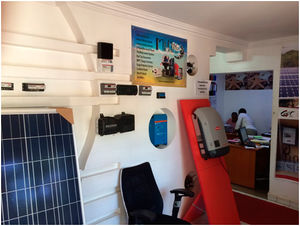Difference between revisions of "SPIS Toolbox - Pre-select Potential Suppliers"
***** (***** | *****) m |
***** (***** | *****) m (Ranisha moved page SPIS Manual – Pre-select Potential Suppliers – DESIGN to SPIS Toolbox - Pre-select Potential Suppliers without leaving a redirect) |
Revision as of 13:05, 7 June 2017

Introduction
Do want to know all about SPIS – Solar Powered Irrigation System : Please go to the newly launched standalone Solar Powered Irrigation Systems (SPIS) website (www.spis-toolbox.org) , featuring three SPIS toolbox:
- Toolbox for beginners,
- Toolbox for farmers (new SPIS Web based App – to calculate design of the pumps),
- the Toolbox for experts - the updated version - Version 6
and additional resources (Publication about SPIS).
The Toolbox on Solar Powered Irrigation Systems (SPIS) is designed to enable advisors, service providers and practitioners in the field of solar irrigation to provide broad hands-on guidance to end-users, policy-makers and financiers. Risks related to system efficiency, financial viability and the unsustainable use of water resources can thus be minimized. The Toolbox comprises informative modules supplemented with user-friendly software tools (calculations sheets, checklists, guidelines). read more
Modules and tools touch upon:
- assessing the water requirements,
- comparing the financial viability,
- determining farm profitability and payback of investment in SPIS,
- sustainably design and maintain a SPIS,
- highlight critical workmanship quality aspects,
- and many more.

Pre-select Potential Suppliers
Now that a technical design with costing is available, it is time to compare quotations and select a supplier.
Supplier pre-selection: The market for SPIS is still developing. Therefore the solar pumps are mostly not found in the portfolio of traditional agricultural service providers. Instead, PV pump manufacturers often select specialized PV distributors and system integrators to market their products. Several aspects need to be considered when shortlisting potential suppliers/system integrators:
- look for leading brands in the service provider’s portfolio;
- check for long-term experience in the field of solar water pumping;
- check if a regional distribution network and a functioning spare part supply exists;
- check whether after-sale services are provided.
Holistic solutions, which include the photovoltaic pump and the water distribution system,can only rarely be found on the market, although it is useful to have integrated system configuration to increase overall system efficiency and reliability of SPIS. Suppliers offering turn-key solutions should be preferred, if they are able to adapt all system components to site conditions and to producer needs.
Quality and safety requirements: A precondition for safe operation and durability of the SPIS is that all system components fulfill minimum quality and safety standards. When requesting quotations and tender bids, it should be clearly stated that only high-quality products, which meet international standards (e.g. IEC, ISO)are to be offered. Certificates have to be provided by the system integrator to confirm system quality. A quotation should also include the service provider’s after-sale warranty and service details and costs.
Also assess whether the service provider maintains any local representation in the area of the farm. This enables swift response to maintenance and repair requests, including spare part supply. Long service response times can result in crop damage during system breakdowns.
Design data and timing: A complete set of high-quality design data has to be included when requesting a quotation. The accuracy of the site-specific sizing data (Vd, Ht,G) needs to be assured. A submission deadline for quotations/offers should be set by leaving sufficient preparation time (e.g. 4 weeks).
Outcome/Product
- Request for quotation;
- If a tender process is preferred to a straight-forward dealer/buyer arrangement: set of tender documents, including a comprehensive description of system requirements;
- System cost and after-sale services included in quotations/ offers.
Data Requirements
- Results of on-site data collection;
- Information on product portfolio;
- Experience of potential suppliers/retailers.
Important Issues
- An integrated SPIS design that includes a pumping and irrigation system is usually not available – system components need to be harmonized to provide the best result.
- Large quality differences exist in all system components available on the market.




















